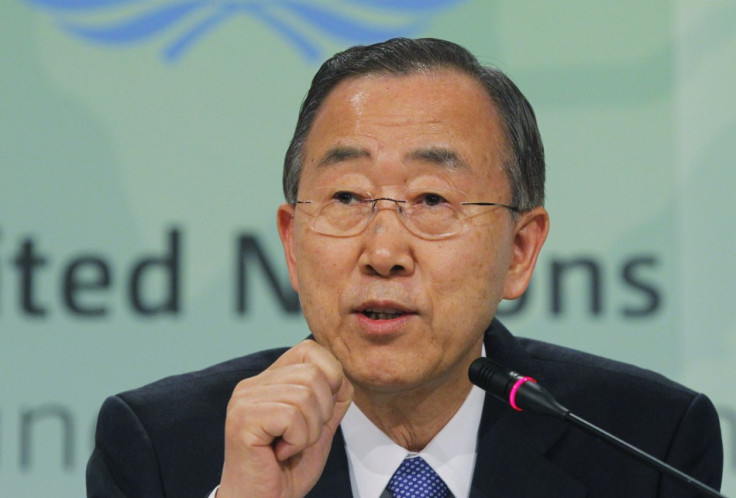Durban: Ban Ki-moon Demands Action on Green Climate Fund

Attempts to secure a legally-binding climate agreement could be "challenging" U.N. Secretary-General Ban Ki-moon said Wednesday, according to the Mail and Guardian.
But he's not giving up hope to secure a deal for a global climate fund before the climate talks end on Friday.
Speaking at the climate change conference in Durban, South Africa on Wednesday, Ban called on global leaders to resolve any differences they have on the Green Climate Fund, to ensure it can be launched.
The fund, agreed on at U.N. climate talks in Cancun in 2010, aims to raise and distribute $100 billion per year by 2020 to assist developing and vulnerable nations to tackle the impacts of climate change.
Ban said the U.N. was "deeply committed" to the scheme to ensure developing countries can access and use the funds.
"There is still a long way to go towards mobilising the $100 billion by 2020," Ki-moon told conference attendees, according to the Mail and Guardian. "We've entered a time of economic uncertainty, an era of fiscal austerity, but I cannot stress enough how important it is for developing countries to fulfill their obligations."
As one of the priorities going into the summit, formally known as the 17<sup>th Conference of the Parties (COP17), the Green Climate Fund was always expected to reach agreement. But because of the money involved to drive the fund, negotiations have been contested by countries such as the U.S., Saudi Arabia and Venezuela who raised concern over the document being considered.
However, following a series of informal discussions, agreements have progressed and insiders predict it will be likely that the fund will be activated by the end of the conference.
Environmentalists and NGOs have warned that if countries do not honour pledges to raise money for the fund, it would become "an empty shell".
Only $415 million of the $2 billion required has been pledged to date to help implement adaptation initiatives. Many are concerned that unless reliable and consistent sources of funding are found, the Green Climate Fund will fail to exist.
Ban reinforced these sentiments on Wednesday and in November at Climate Vulnerable talks in Dhaka, Bangladesh.
"The new fund must not be an empty shell," Ban said, adding that although developed countries would have to inject sufficient capital, it was not enough to rely on public sources of funding.
It would be essential to have a combination of public and private sources of funding, Ban said.
"The scale of resources and the kind of investment requires governments to work together with private sector."
Negotiators at the climate change conference were still worlds apart nine days after commencing discussions that would influence a second commitment period of the Kyoto Protocol.
With only two days left before the summit ends, competing national interests have restricted negotiators representing more than 130 countries from reaching a mutually acceptable agreement.
"The negotiations of the coming days will be challenging. We must be realistic about our expectations in Durban. A binding agreement may be out of our reach for now, but none of this prevents us from moving on key issues," Ban said.
© Copyright IBTimes 2025. All rights reserved.





















